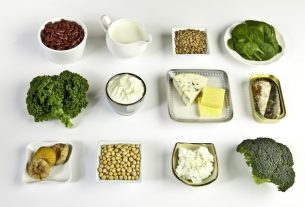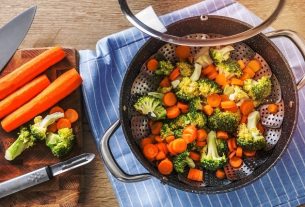Some of the foods that give energy are coffee, ginger, red pepper and cocoa, for example, as they contain caffeine, capsaicin or gingerol, bioactive compounds that also help improve physical and mental disposition.
These foods stimulate the nervous system, increasing metabolism, reducing the feeling of tiredness and improving concentration, and can be used when you are tired, to increase productivity at work or before training, for example.
Although they can be consumed every day, these foods should be avoided at night, as they promote a state of alertness and excitement that can alter sleep, especially in people who have difficulty sleeping.

Some of the main foods that give energy and improve mood are:
1. Café
Coffee has great antioxidant properties and has large amounts of caffeine, a bioactive compound that is responsible for stimulating the nervous system, improving energy and concentration and reducing sleep and tiredness. Discover other health benefits of coffee.
How to consume: To obtain the stimulating benefits of coffee when you are tired or sleepy, for example, you can consume 4 cups of brewed coffee, or 600 ml, per day. People with high blood pressure should drink a maximum of 2 cups of brewed coffee per day.
When not indicated: children under 12 years of age, people with gastritis, reflux, insomnia and anxiety should avoid drinking. Pregnant women, those planning to become pregnant or breastfeeding, should consume a maximum of 200 mg of caffeine per day, which corresponds to a total of 2 cups of 150ml of brewed coffee.
Furthermore, it is not recommended to drink coffee with other foods that contain caffeine, such as green tea, guarana, mate or chocolate, as excess caffeine can cause palpitations, nausea, dehydration, as well as causing long-term dependence.
2. Beetroot juice
Beetroot juice is rich in nitric oxide, a compound responsible for increasing the circulation of oxygen in the blood to the muscles, arteries and brain, improving energy, concentration and mood. Beetroot juice also improves performance during workouts and facilitates recovery after exercise.
How to consume: It is recommended to drink around 250 ml of beet juice per day, which can be during lunch, dinner or breakfast. To improve performance during training, you can drink this juice 30 minutes before starting physical activity, or immediately after, for better post-workout muscle recovery.
When not indicated: Beetroot juice should be consumed in moderation by those with kidney stones. Furthermore, people with chronic kidney problems should only consume beetroot juice under the guidance of a doctor or nutritionist, as this vegetable has good amounts of potassium.
3. Green tea
Green tea contains caffeine, catechins and theobromine, compounds that act on the nervous system, giving energy and helping to improve mood almost immediately. See all the benefits and how to prepare green tea.
How to consume: You can drink a total of 4 cups of green tea throughout the day, before or after meals, or before exercising.
When not indicated: green tea is not recommended for people with insomnia, gastritis, reflux, ulcers, thyroid changes, kidney or liver problems, and anemia. It is also not recommended for children, pregnant women or women who are breastfeeding.
Furthermore, green tea can interfere with the action of anticoagulant medications for high blood pressure and high cholesterol and, therefore, this drink should only be consumed under the guidance of a doctor in these cases.
4. Maca peruana
Peruvian maca is a root rich in antioxidants with stimulating action, improving concentration, energy and disposition, and is also recommended for those who practice physical activities. Discover the medicinal properties of Peruvian maca.
How to consume: Peruvian maca can be consumed in root or powder form, added to juices, salads, smoothies or fruits, or even 60 minutes before physical activity. You can find Peruvian maca in health food stores and the maximum recommended amount is 3 g per day.
When not indicated: Peruvian maca should not be consumed by children, pregnant women or women who are breastfeeding. It should also not be used by women with a history of any estrogen-dependent disease or cancer, such as endometriosis, uterine fibroids, breast, ovarian or uterine cancer.
5. Guarana
Guarana is a fruit rich in theobromine and caffeine, bioactive compounds responsible for increasing mood and energy, as well as stimulating concentration, reducing tiredness and sleep. Discover the advantages of consuming guaraná on a daily basis.
How to consume: Guarana can be found in the form of capsules for supplementation, or sold in dehydrated and powdered form, and can be diluted in water, juices or vitamins. The fruit can be consumed throughout the day in a maximum quantity of 5g.
When not indicated: Guarana should be avoided by people with gastritis, ulcers, reflux, kidney disease, epilepsy, heart problems, anxiety and insomnia. Children, pregnant women and women who are breastfeeding should also not consume guarana.
Furthermore, it is not recommended to consume guarana together with other foods with caffeine, such as coffee, green tea, mate, chocolate, as excess of the substance can cause palpitations, nausea, dehydration or dependence in the long term.
6. Cocoa
Cocoa has great amounts of fat, providing energy for the body, in addition to being rich in caffeine and theobromine, compounds that help speed up metabolism, improving mood and reducing sleep. See how to enjoy all the benefits of cocoa.
How to consume: The maximum recommended consumption of cocoa powder per day is 6 tablespoons, which can be added to fruit, yogurt or milk, for example, during breakfast, snacks or when you need to increase energy and concentration.
When not indicated: People who have difficulty sleeping or have problems such as gastritis, reflux or ulcers should avoid consuming cocoa.
7. Red pepper
Red pepper is rich in capsaicin, a compound that stimulates the nervous system, increasing energy and improving mood. Discover other benefits and see how to consume pepper.
How to consume: The suggested pepper recommendation is between 0.9g and 16.5g per day, which can be used fresh or dehydrated in stews, soups or beans, for example.
When not indicated: people with gastritis, reflux, ulcers or high blood pressure should avoid consuming pepper. Furthermore, the consumption of pepper should be avoided by those who have hemorrhoids, which are small veins in the anus that cause pain and difficulty in having a bowel movement.
8. Cinnamon
Cinnamon is a spice that is a source of bioactive compounds, such as antioxidants and eugenol, which provide energy to the body, as well as improving mood and concentration. See other health benefits of cinnamon.
How to consume: You can consume up to 3 teaspoons (6g) of cinnamon powder throughout the day, which can be added to yogurt, fruit, juices, or in savory preparations, such as chicken, rice and pork. Furthermore, cinnamon sticks can also be used to prepare teas. Learn how to prepare cinnamon tea.
When not indicated: Cinnamon should not be consumed by children, pregnant women and women who are breastfeeding. It should also not be used by people with ulcers or serious liver diseases. People taking medications for diabetes, heart problems, or antibiotics should speak to a doctor before using cinnamon.
9. Ginger
Ginger is a root source of 6-gingerol and 8-gingerol, bioactive compounds that are responsible for improving energy and mood. Furthermore, ginger also helps reduce sleep, stimulate memory and improve concentration.
How to consume: you can consume fresh or dehydrated ginger root in a maximum amount of 5g per day, which can be used in salads, soups and yogurt. Furthermore, ginger can also be used in teas by placing 2 to 3 cm of the fresh root in a pan with 180 ml of water and letting it boil for 5 to 10 minutes. See how to use ginger in your everyday life.
When it is not indicated: Consuming ginger in excessive amounts can cause hypoglycemia in diabetics and insomnia in people with sleeping problems. People with heart problems should consult a cardiologist before consuming the root. Furthermore, the consumption of ginger is not recommended for those who have gastritis or ulcers.
10. Hibiscus
Hibiscus is a flower with excellent amounts of vitamin C, B vitamins and antioxidants that help speed up metabolism, reducing tiredness, increasing energy and improving mood. Discover the other health benefits of hibiscus.
How to consume: The hibiscus flower can be used in salads, teas, jellies, pies or in the form of juice. In the form of tea, you can drink 2 cups a day, with main meals or as morning or afternoon snacks.
When not indicated: Hibiscus is not recommended for children under 12 years of age. Just as its consumption is not recommended during pregnancy or breastfeeding, by people with serious heart disease, kidney or liver disease. This flower should also not be used together with the medicine hydrochlorothiazide, as the plant can interact with the medicine, reducing its effect.

Sign up for our newsletter and stay up to date with exclusive news
that can transform your routine!
Warning: Undefined array key "title" in /home/storelat/public_html/wp-content/plugins/link-whisper-premium/templates/frontend/related-posts.php on line 12
Warning: Undefined array key "title_tag" in /home/storelat/public_html/wp-content/plugins/link-whisper-premium/templates/frontend/related-posts.php on line 13




